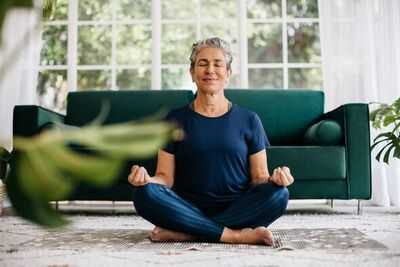Staying active after 60 is vital for long-term health, yet many older adults inadvertently pick up habits that limit mobility, weaken muscles, or increase the risk of injury.
Lucy Macdonald, a physiotherapist with RestartPhysio, has highlighted six common behaviours she wishes her patients would stop - and offers guidance on healthier approaches.
1. Assuming balance decline is inevitableOne of the biggest misconceptions among people over 60 is that falling or losing stability is simply part of getting older. Macdonald stresses that balance can be improved at any age. "Even small exercises, practiced consistently, can significantly reduce the risk of falls," she says.
Simple exercises can be integrated into everyday routines. For instance, standing on one leg while brushing your teeth or reaching for items in the kitchen while maintaining core stability challenges balance in a safe, practical way. Classes such as tai chi or yoga are also excellent for improving coordination and reaction times, which can make daily life safer and more confident.
 2. Overestimating your past habits
2. Overestimating your past habits It's easy to assume that youthful lifestyle choices won't catch up with you, but Macdonald warns that the body's recovery slows with age. Neglecting diet, sleep, or exercise may have gone unnoticed in your 40s, but the effects become more pronounced after 60.
"Even minor changes in nutrition, sleep routines, and activity levels can have a major impact on energy, mobility, and overall wellbeing," she notes. Studies show that switching to a Mediterranean-style diet rich in vegetables, seeds, oily fish, and olive oil can increase life expectancy, even for those in their 70s. Macdonald encourages combining dietary improvements with regular activity to protect muscles, joints, and cognitive function.
3. Believing your best days are behind youMany over-60s unconsciously limit themselves because of age. Macdonald says this mindset is one of the biggest barriers to staying fit. "I've met people in their 70s who are fitter than they were in middle age because they've prioritised their body and mind after retirement," she says.
With fewer work and family commitments, older adults often have more time to explore hobbies, take regular walks, or join social exercise groups. Pursuing enjoyable activities is crucial: physical and mental health both benefit when movement is paired with motivation and enjoyment.
4. Hesitating to try new activitiesFear of the unfamiliar is another barrier. Many people assume it's too late to take up sports or classes, but Macdonald says this could not be further from the truth. Trying something new - even later in life - can strengthen muscles, improve flexibility, and boost mood.
Whether it's swimming, dance classes, cycling, or even learning a martial art adapted for older adults, the key is enjoyment. Being part of a group also adds a social component, which can improve adherence and provide a sense of community.
Building and maintaining muscle mass is critical for mobility and injury prevention, yet many older adults shy away from weight or resistance exercises. Macdonald explains that even short sessions are effective: "Two half-hour sessions per week, working all major muscle groups, is enough to see improvements," she says.
Starting with light weights or resistance bands and gradually increasing intensity is key. Supervised sessions, either with a physiotherapist or trained instructor, help ensure correct technique and prevent strain. Strength training also benefits bones, heart health, and overall endurance, making it an essential component of healthy ageing.
6. Doing too much too quicklyFinally, Macdonald notes that sudden bursts of intense activity are a leading cause of injury. Whether it's an ambitious gardening project, a weekend DIY task, or joining a sports game unprepared, the body can easily be overstrained.
Gradual progression is essential. Breaking tasks into manageable chunks, warming up properly, and building strength over time reduces the risk of sprains, strains, and joint pain. Macdonald also encourages older adults to listen to their bodies: fatigue, soreness, or discomfort are signals to slow down, not push harder.
You may also like

Death Threats to Devotional Singer Hansraj Raghuvanshi Spark Security Alarm in Himachal Pradesh

Koraput Coffee truly delectable, pride of Odisha: PM in 'Mann Ki Baat'

Indian Army flags off 'Saddle Borne Warriors' motorcycle rally in Missamari

Youth Aapda Mitra Training Program Kicks Off in Dalhousie

Arrest Made in Alleged Molestation Case Involving Australian Cricketers in Indore






